The next time you visit an ancient temple in Siem Reap, Cambodia, all you need for entry may be just your smartphone, showing the electronic ticket you bought online.
At least that’s what one Portuguese startup is trying to make happen. Last2Ticket, which offers digital ticketing solutions to venues and event organizers, is one of the sector’s first movers into Cambodia. It will also announce its expansion to Asia next month, where it’s eyeing more markets, such as Thailand and Vietnam.
But for this year, Cambodia is its priority, said the company’s founder and CEO Emilía Simões.
Ticketing revenues in the Southeast Asian nation are more than US$100 million a year, according to Last2Ticket’s estimates. Of that entire market, tourism – a US$3 billion industry in Cambodia – commands the largest share. Naturally, that’s where the company is focused.
“Think about the number of visitors that travel every year to Siem Reap to visit the temples,” Simões told CompassList in an interview via Skype.
So far, passes to those temples are only available from an official ticket office, and lines can be long.
Finding its niche
Last2Ticket has literally come a long way. Simões, 41, founded the company in Porto, Portugal’s second-largest city, nearly six years ago. It was based on a business plan she had worked on during her MBA studies at Porto Business School after leaving Motorola, where she was a systems engineer for 10 years.
“The buying and distribution process of tickets was still so poor [then], especially in terms of experience. Many times, you still have to go to a place to get your ticket, and it is still in paper form,” she said. “Why not have ticketing in digital? This was the main goal.”
When Last2Ticket started, the landscape was dominated by three established players, Ticketline, Blueticket and Bol. All three focus on arts and music festivals, and concerts; Last2Ticket, in turn, mostly handles conferences, even fashion shows.
With a team of three and funded by a government grant, Last2Ticket clinched its first deal to supply e-tickets at a music festival in August 2011. The event was called Surf at Night, where the crowd surfed and attended a concert by the beach.
“It was a big challenge because of the environment – we were very close to the ocean,” Simões recalled. “We thought we couldn’t do it, but we did. It was a success.”
Today, Last2Ticket not only offers Passbook/Wallet-integrated e-ticketing for event organizers, it also sells customized solutions, such as personalized e-tickets with event programs, and e-tickets convertible to badges. These tailored solutions, plus the commission it earns on ticket sales, chalked up €1.6 million in sales for the company in 2015.
Last2Ticket has also long broken even – “three years after we launched” – Simões said. She declined to comment further.
Cambodia: Gateway to Asia
In Porto, where it’s based at the UPTEC incubator, Last2Ticket has grown to a team of nine, including four software engineers driving product development. Its three-person team in Cambodia was created just in January 2017, and handles local sales and marketing.
It also has a local partner in Cambodia since early 2016. Confluences, a Phnom Penh-based incubator, takes care of Last2Ticket’s legal and administrative matters there, and helps the Portuguese startup adapt to the local conditions. The two sides met through a small group of European private investors, who are backing Last2Ticket’s expansion to Cambodia.
“Last2Ticket is very innovative in its approach of e-ticketing management, a growing market in Cambodia… and we hope, once we succeed in Cambodia, to expand our activities to the neighboring countries,” wrote Soreasmey Ke Bin, the managing director of Confluences, in an e-mail.
Profit will be split three ways, he said, with the investors taking 40%, Last2Ticket getting 35% and the remaining 25% going to Confluences.
Last2Ticket’s first public event in its new market, the Audi International Jazz Festival in Phnom Penh last December, was a hit – even to Simões’s own surprise.
“We initially thought that we would not be able to sell so many tickets, that maybe the market was not ready [for e-ticketing]. But we had a lot of ticket sales… and eventgoers were using Visa and PayPal to pay.”
Solving payments
Still, payments is a crucial area that Simões is working on, to adapt Last2Ticket for the Cambodian market.
Compared with Portugal, internet connectivity in Cambodia can be patchy, especially outside big cities. The country also has a large population with no banking access. So, Last2Ticket has partnered with Wing, a local offline payment company. Another payment system is also being developed.
“The plan is to be so adaptive that even if people go directly to a shop to pay for the ticket, the reservation will still be online,” she said.
Operating in Asia would also mean setting up a separate website for the region, and building it to be more mobile compatible, given the mobile-first culture of Asian users, and as there are no plans to create a Last2Ticket application yet, she said.
And what about approaching Asian investors to come onboard?
“Not for now,” Simões replied, smiling, “but we’d never know.”











